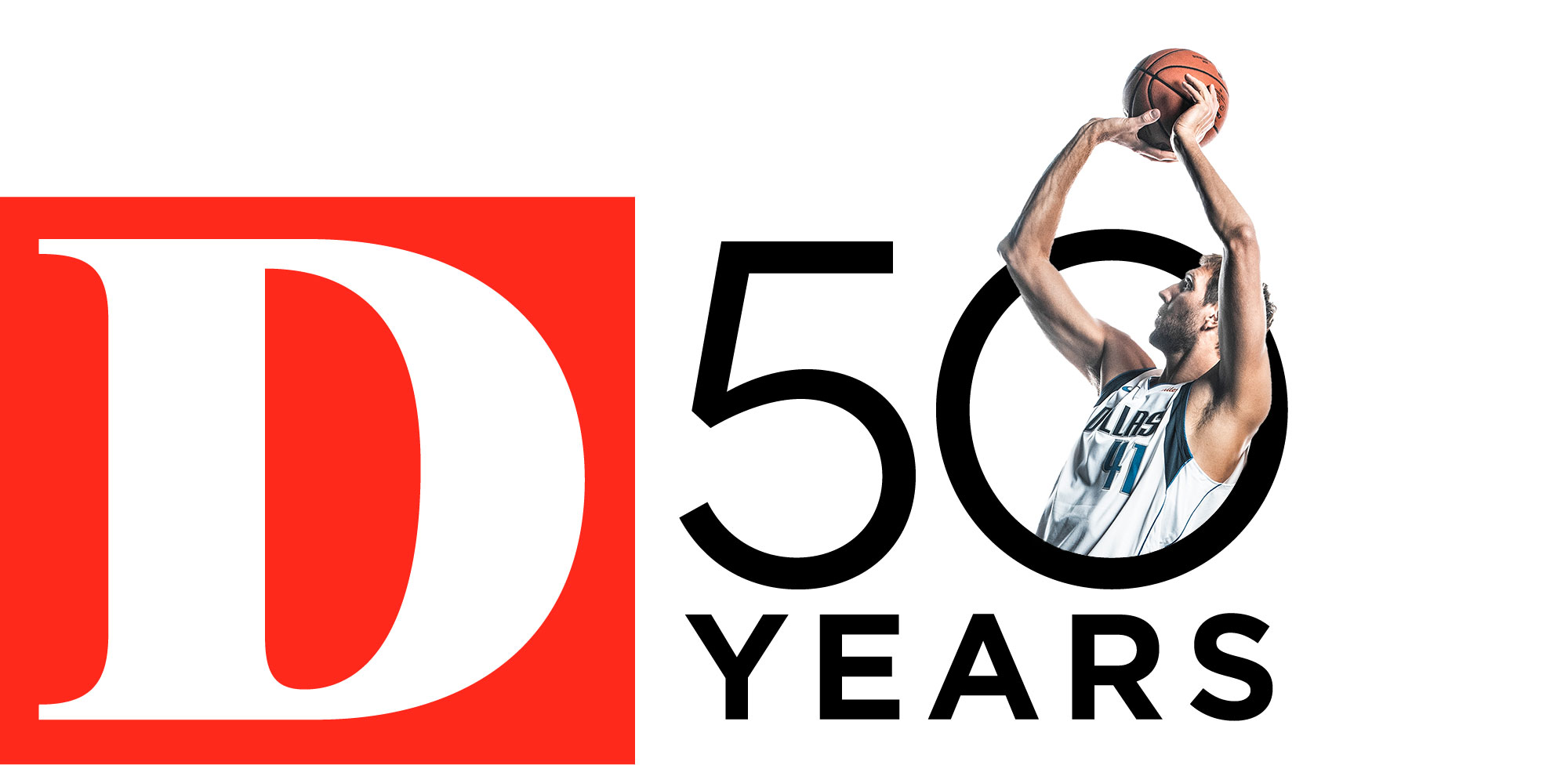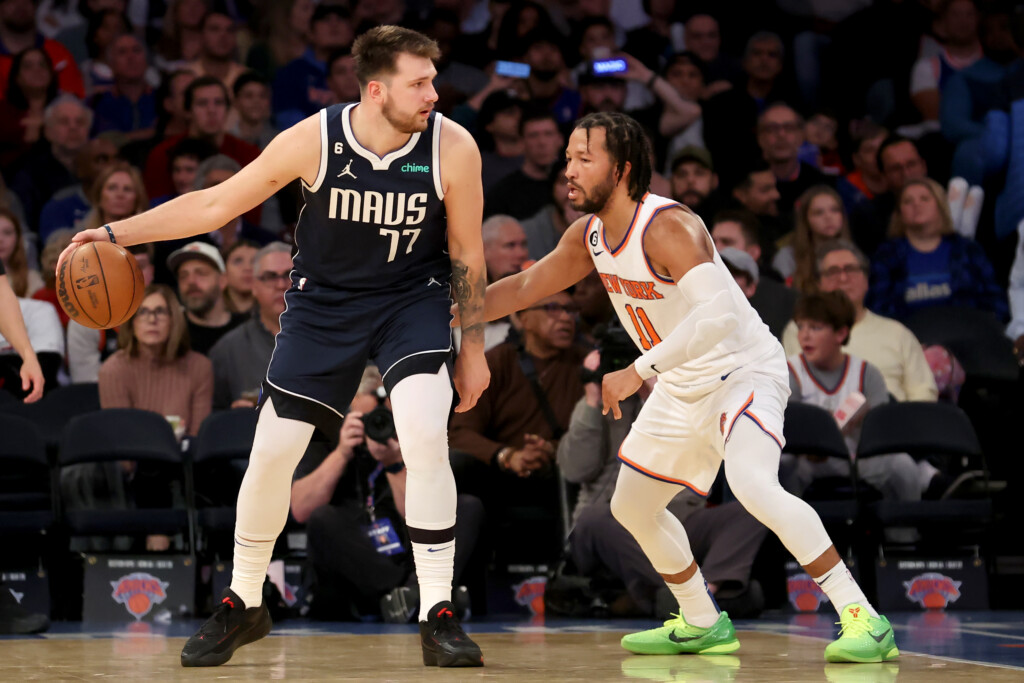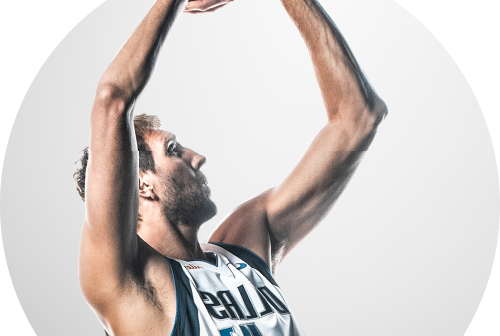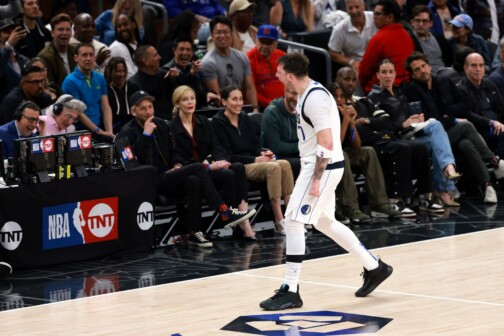Mark Cuban gave a rare, impromptu media availability ahead of last night’s Mavericks win over the Kings, and as Cuban is wont to do, he said a lot of stuff. The Morning News’ Brad Townsend and The Athletic’s Tim Cato each devoted time to transcribing Cuban’s takes on everything from the team’s underwhelming record (it’s his fault), Jason Kidd’s performance this season (also Cuban’s fault, apparently), Kyrie Irving (he’s a good time), and more. I encourage you to read both.
But we’re here to discuss Jalen Brunson, because I suspect on some level that we will never stop discussing Jalen Brunson until the Mavericks win a championship, and perhaps not even then. One thing about Jalen Brunson, in particular. We’ll get there.
For those (mercifully) not in the loop, Brunson is playing the best basketball of his career in his first season with the New York Knicks, which just so happens to coincide with the Mavs’ spiral down the Western Conference standings. Correlation is not necessarily causation, sure, but it’s hard not to consider when a conference finals team loses its second-best player for nothing. This was apparent before Luka Doncic channeled the Wolverine meme after he was asked about Brunson on Tuesday.
Luka Doncic mentioned that Mavs haven't been able to recreate chemistry from last season. How much have they missed Jalen Brunson?
— Tim MacMahon (@espn_macmahon) April 4, 2023
"A lot," Doncic said with a pained smile. "I mean, amazing guy, amazing player, for sure."
All of this is especially searing given that Brunson recently told Turner Sports’ Chris Haynes that “I wanted that role of being with the Mavericks for the long haul of my career.” More damningly, Brunson has said he would have signed a bargain of a four-year, $55.5 million contract extension prior to last season’s trade deadline, but the Mavericks never offered it.
Here’s what he said to Haynes:
“There were two times that I thought we had offers on the table before the season, and then around, I think December or January, they looked the other way,” Brunson said. “They had every right in the world to do so. I don’t blame them for making any business decisions. That’s on them.”
That jibes with an interview that Brunson’s father, Knicks assistant Rick Brunson, gave ESPN’s Tim MacMahon last year on the subject. The elder Brunson stated that his son would have accepted the offer as late as January just prior to the deadline. Brunson would go on to get $104 million from New York over four years, seemingly putting a bow on the latest disastrous Mavs free-agent saga.
Until, that is, Cuban brought out the apparent receipts last night. The spiciest element of this media availability, by far, was the Mavericks governor’s long-awaited rebuttal to the Brunsons, in which he alleged, among other things:
1. Talks were going smoothly until Rick Brunson (and perhaps his wife, too?) inserted himself in negotiations.
2. The actual price to get Brunson to stay prior to free agency was never as low as quoted and, due to the Mavericks’ cap situation, would have been impossible to meet last season unless the team offloaded salary prior to the trade deadline.
3. Once free agency started, Cuban was never given a number to match last summer by Brunson’s team to stay in Dallas.
4. That, knowing what Brunson signed for in New York, Cuban “would’ve paid that in a heartbeat.”
5. It was never really about the money—and, to prove his point, Cuban read a text message he said was sent to him by Mavericks general manager Nico Harrison from February 2022 in which Harrison says, “I think just the New York thing is too tied to their family to overcome.”
Got all that?
If you care about the Mavericks, you almost certainly have an opinion. Perhaps it was that Dallas should have money-whipped Brunson with the four-year, $55.5 million offer during the summer of 2021, after he was phased out of the rotation in the Mavericks’ first-round loss by departing head coach Rick Carlisle and his leverage was at its nadir.
Maybe it’s that Cuban found some way to communicate with Brunson’s people—phone, text, fax, Zoom, courier, carrier pigeon, barricading himself in Brunson’s home, what have you—that Dallas could and would top New York’s best offer given that they owned Brunson’s Bird rights and therefore could make a five-year offer versus a four-year by any outside party.
Or it could be that the Mavs are right, and this was way bigger than raw dollars because the Knicks stacked the deck with too many personal connections for Brunson to turn down.
The truth is likely somewhere in between. This was an extremely unusual negotiation involving intangible factors that would always be tough for Dallas to beat. But if the last decade and a half has taught us anything, it’s that the Mavericks haven’t earned the benefit of the doubt in free agency and almost certainly didn’t play this perfectly.
And, besides, none of this stuff is the real point anyhow.
There is one ironclad move Dallas could have made at a minimal cost that would have positioned Brunson to still be here at a significantly lower amount than either that $55.5 million extension or the nine-figure money he landed in free agency.
As for what that is, I’ll refer you to second-round sensation Jaden Hardy’s rookie deal, which looks like this:
Notice that last line? The Mavericks wisely structured the contract to allow Hardy to enter restricted free agency after his third season, thereby allowing them to match any offer he receives, presuming they hadn’t already extended him themselves. It’s a very simple, very common, very affordable way to maintain the upper hand on players a team drafts.
And it’s something the Mavericks could have done with Brunson. Instead, they signed him to a straight four-year deal that dumped him into unrestricted free agency, which is how he got to the Knicks.
They did this for … reasons. Well, probably reason, singular: it guaranteed the team a cheap final season of control instead of giving Brunson a raise a year earlier, thereby cutting into the team’s available cap space in a season when Giannis Antetokounmpo, among other players, was set to hit free agency. (The irony, of course, is the Mavs infamously passed on drafting Antetokounmpo by trading down to select Shane Larkin in an ill-fated attempt to create more cap space to sign Dwight Howard on the open market. I’ll spare you the rehash of how that went.)
We can’t blame Dallas for not anticipating that Brunson would become this good. Second-round picks rarely do. Where the Mavs can be blamed is not positioning its front office to hold all the cards if the improbable played out. That was still more likely than Giannis moving south (or that this one transaction would have been the make-or-break dollar figure standing in the team’s way if he wanted to).
Had the Mavericks given Brunson the deal they later delivered Hardy—and, yes, you are well within your rights to wonder whether the latter would have happened had the former not gone so terribly—Brunson would have entered restricted free agency just after that Clippers series, when he watched the since-departed Trey Burke hijack his minutes.
The Mavs, or someone else, could have signed him at a very comfortable rate, because guys who can’t crack 15 minutes in any of the last three games of a first-round playoff series a year removed from missing the playoffs entirely on account of season-ending shoulder surgery don’t exactly print money on the open market.
Maybe they’d have given him a one-year deal anyway, thereby taking Brunson to the open market last summer anyway, and the whole process would have repeated itself. In all likelihood, it wouldn’t have. No matter the outcome, the Mavericks could have dictated the terms of engagement instead of playing off the back foot.
Whether or not you’re attuned to NBA transactions, the amount you hear about the glaring mistake in Brunson’s first contract is a fraction of how much attention is given to the two negotiation windows. I’m talking a disparity on par with the height gap between Avery Johnson and Boban. Why? No idea, other than time gnaws at our memories and this all went down in a pre-COVID world when we frolicked freely and ChatGPT wasn’t in the early stages of plotting a Skynet global takeover.
But it happened. It’s a clear procedural failure unlike everything else that played out over the past nine months—months that are defined by a near-total lack of clarity what really went down and who really is at fault.
The Mavericks did drop the ball with Jalen Brunson. It just happened a lot longer ago than people mention.
Author








